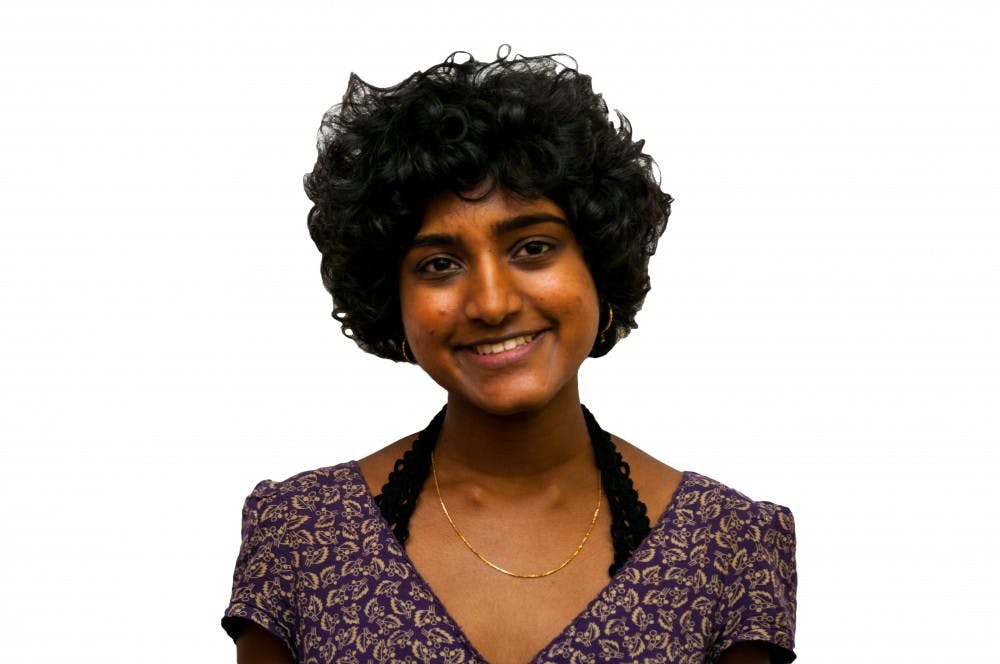My mother, for as long as I can remember, has urged me to befriend more of my fellow Indian-Americans, particularly Hindu ones. It’s for my own good, she says — even more so now that I’m in college, where it’s so easy to get lost, but also so easy to find other Indian-Americans. “What if we don’t have anything in common?” I say. “You always have your culture in common,” she replies, and I can never argue much with that.
The trouble is that to me, “culture” has never seemed like enough. This isn’t to say that I haven’t found fulfillment in sharing my heritage with other Indian-Americans at Penn; it’s just that every instance of that sharing (usually about Indian food) has to me been somehow incomplete, transient.
It’s not anyone’s fault; I suspect this is because I didn’t grow up versed in the right kind of Indian culture. Sure, I attended the Hindu equivalent of Sunday school, Balavihar, and even went through the spelling bee circuit with the best of them — but at age 14, I outgrew the latter and became too “atheist” for the former. That ended most regular interaction I had with Hinduism and I’ve been feeling the real or imagined effects of that ever since.
What I didn’t realize is that there are a variety of ways to find one’s cultural footing in a new environment, and not all of those ways involve interacting with other people — despite what my mother told me before I came to Penn. My own cultural background drew me to South Asian studies, but I’ve managed to ground myself in the study of South Asian cultures and ideas that I’d never heard of before. Courses in ethnic studies departments — because they’re about real people with real beliefs — can prove entirely fulfilling even to people who have little or no ethnic connection to the culture they study.
Last fall, I found that my Western-centric philosophy class bored me, and, right before the add/drop deadline, I realized that I might find Indian philosophy more stimulating. During the first weeks of class, I began to recognize terms I’d heard in childhood — in Balavihar classes, or from my grandparents.
The lectures were instructive and fascinating, and each time that jolt of recognition arrived, I felt guilty for not having paid more attention to my elders and teachers as a child, for not having shown any interest in what they were saying, whether they were trying to teach me about language, religion or philosophy. I enjoyed the class on its own merits, but part of me also felt that I was atoning for my many, many years of not caring, and that process helped me (and continues to help me) find my feet in the Indian-American world.
I almost didn’t write this column because I was afraid it’d be taken the wrong way — that you might think that ethnic studies programs only benefit people who somehow find it easiest to engage with their own heritage in an academic setting. I completely understand how my experience would seem to say that South Asia Studies courses were “useful” to me because I am South Asian and this would imply that they would not be “useful” to people who are not South Asian.
But in characterizing these courses as “useful” or “not useful” based on their relevance to our individual heritage, we’re being more severe on ethnic studies than we tend to be on most other fields. We choose so many courses based on interest alone; why should we treat ethnic studies courses any differently?
I admit that my initial interest in South Asia Studies was fueled by a desire to learn more about my ancestors’ country and culture. At this point, though — after three semesters of taking courses in Indian philosophy, religion, history and language — I find that my continuing interest in the field is simply because it’s, well, very interesting! I approach it no differently than I would any other. The courses often contain very little of what I learned growing up; sometimes they contradict that knowledge, favoring an outsider’s academic, objective perspective, and most of the time they cover subjects that I’d never even heard of in my previously narrow conception of South Asian culture.
Support ethnic studies; the word “ethnic” shouldn’t automatically stigmatize these fields and make them less than any other. Support them if you’re an ethnic minority — and recognize that they’re a perfectly valid way of engaging with your heritage. And support them if you’re not — their academic contribution is just as interesting and valuable as that of any other field, and as a bonus, sometimes they can bring a little extra light into a lost student’s life.
SHILPA SARAVANAN is a College junior from College Station, Texas, studying linguistics. Her email address is shilpasa@sas.upenn.edu. “Phone Home” usually appears every Thursday.
The Daily Pennsylvanian is an independent, student-run newspaper. Please consider making a donation to support the coverage that shapes the University. Your generosity ensures a future of strong journalism at Penn.
Donate





